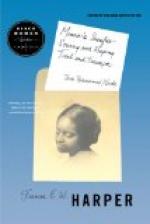Chapter VI
For awhile Mrs. Harcourt was busy in preparing the supper, to which they all did ample justice. In her white apron, faultless neck handkerchief and nicely fitting, but plain dress, Mrs. Harcourt looked the impersonation of contented happiness. Sorrow had left deep furrows upon her kindly face, but for awhile the shadows seemed to have been lifted from her life and she was the pleasant hostess, forgetting her own sorrows in contributing to the enjoyment of others. Supper being over, her guests resumed their conversation.
“You do not look upon the mixing of the schools as being necessarily disadvantageous to our people,” said the minister.
“That,” said Mr. Thomas, “is just in accordance to the way we adapt ourselves to the change. If we are to remain in this country as a component part of the nation, I cannot fail to regard with interest any step which tends toward our unification with all the other branches of the human race in this Western Hemisphere.”
“Although,” said Mrs. Lasette, “I have been educating my daughter and have felt very sorry when I have witnessed the disappointment of parents who have fitted their children for teachers and have seen door after door closed against them, I cannot help regarding the mixing of the schools as at least one step in a right direction.”
“But Mrs. Lasette,” said the minister, “as we are educated by other means than school books and blackboards, such as the stimulus of hope, the incentives of self-respect and the consensus of public opinion, will it not add to the depression of the race if our children are made to feel that, however well educated they may be or exemplary as pupils, the color of their skin must debar them from entering avenues which are freely opened to the young girls of every other nationality.”




